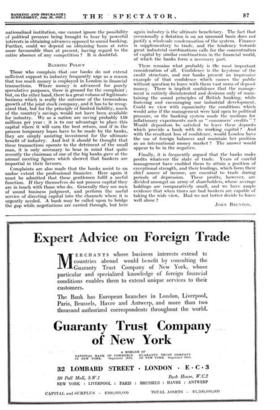BANKING POLICY Those who complain • that- , our banks
do not extend sufficient support to industry frequently urge as a reason that too much money is employed in London in financial transactions. Where money is advanced for purely speculative purposes, there is ground for the complaint ; but, on the other hand, there is a great volume of legitimate business which is really the outcome of the tremendous, growth of the joint stock company, and it has to be recog- nized that, but for the principle of limited liability,. much of the country's savings. would not have been, available for industry. We as a nation are saving probably 150 millions per year : it is to our advantage to place this capital where it' will earn the best return, and if in the process temporary loans have to be made by. the banks,, they are simply assisting investment for the ultimate benefit of industry. And lest it should be thought that these transactions operate to the detriment of the small man, it is only necessary to bear in mind that quite recently the chairman of one of the big banks gave at the annual meeting figures which showed that bankers are impartial in their favours.
Complaints are also made that the banks assist to an undue extent the professional financier. Here again it must be admitted that these gentlemen fulfil a useful function. If they themselves do not possess capital they are in touch with those who do. Generally they are men of sound business judgment, and perform the useful service of directing capital into the channels where it is urgently needed. A bank may be called upon to bridge the gap while. negotiations are carried through, but here again industry is the ultimate beneficiary. The fact that occasionally a flotation is on an unsound basis does not justify a wholesale condemnation of the system. Finance is supplementary to trade, and the tendency towards great industrial combinations calls for the concentration of capital 'by similar combinations in the financial world, of which the banks form a necessary part.
There remains what probably is the most important consideration of all. Confidence is the keystone of the credit structure, and our banks present an impressive example of that confidence which causes the public without question to leave with them vast sums of deposit money. There is implicit confidence that the manage- ment is entirely disinterested and desirous only of main- taining the sound principles of British banking, while fostering and encouraging our industrial development. Could we view with equanimity the conditions which would arise if the management were laid open to political pressure, or the banking system made the medium for inflationary experiments such as " consumers' credits " ? Would depositors be satisfied to leave these deposits which provide a bank with its .working capital ? And with the resultant loss of confidence, would London have the use of foreign balances and maintain her position as an international money market ? The answer would appear to be in the negative.
Finally, it is frequently argued that the banks make profits whatever the state of trade. Years of careful management have enabled them to attain a position of exceptional strength, and their lendings, which form their chief source of income, are essential to trade during periods of depression. These profits, however, are divided amongst an army of shareholders, whose average holdings are comparatively small, and we have ample evidence that when times are bad bankers are capable of taking the wide view. Had we not better decide to leave well alone ?
JOHN BRUNTON.
















































 Previous page
Previous page